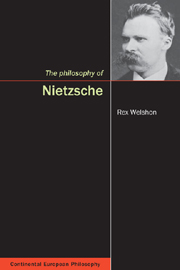7 - Psychology
Summary
Perhaps no other philosopher has as many interesting things to say about the self as Nietzsche. His reflections on the metaphysical status of the self, on consciousness and on some of the darker elements of human psychology have had a dramatic impact both in philosophy and, through the work of Sigmund Freud and others, also in psychology. For all his insight into the role of the unconscious in determining our character, and subtlety in debunking the pretentious claims philosophers make on behalf of consciousness, what Nietzsche is most remembered for is his commitment to the will to power as a psychological explanatory principle. Once it takes hold of his philosophical imagination, he does not waver from the perspective the will to power imposes, and this gives all his mature psychological reflections their characteristic bite.
In this chapter we shall investigate Nietzsche's meta-psychology, that is, his views about the composition and individuation of the self. This meta-psychological investigation will focus primarily on his claims about consciousness and his analysis of the composition of the self. Nietzsche repeatedly argues that consciousness is a relatively unimportant aspect of our psychological lives, and we shall analyse these arguments, showing how his views are best interpreted as claims about the unimportance of what we have already referred to, in Chapter 4, as reflective consciousness. We shall also discuss Nietzsche's notion of drive, distinguishing between conscious and unconscious drives, and discussing the relation between cognitive and non-cognitive psychological states.
- Type
- Chapter
- Information
- The Philosophy of Nietzsche , pp. 135 - 156Publisher: Acumen PublishingPrint publication year: 2004

